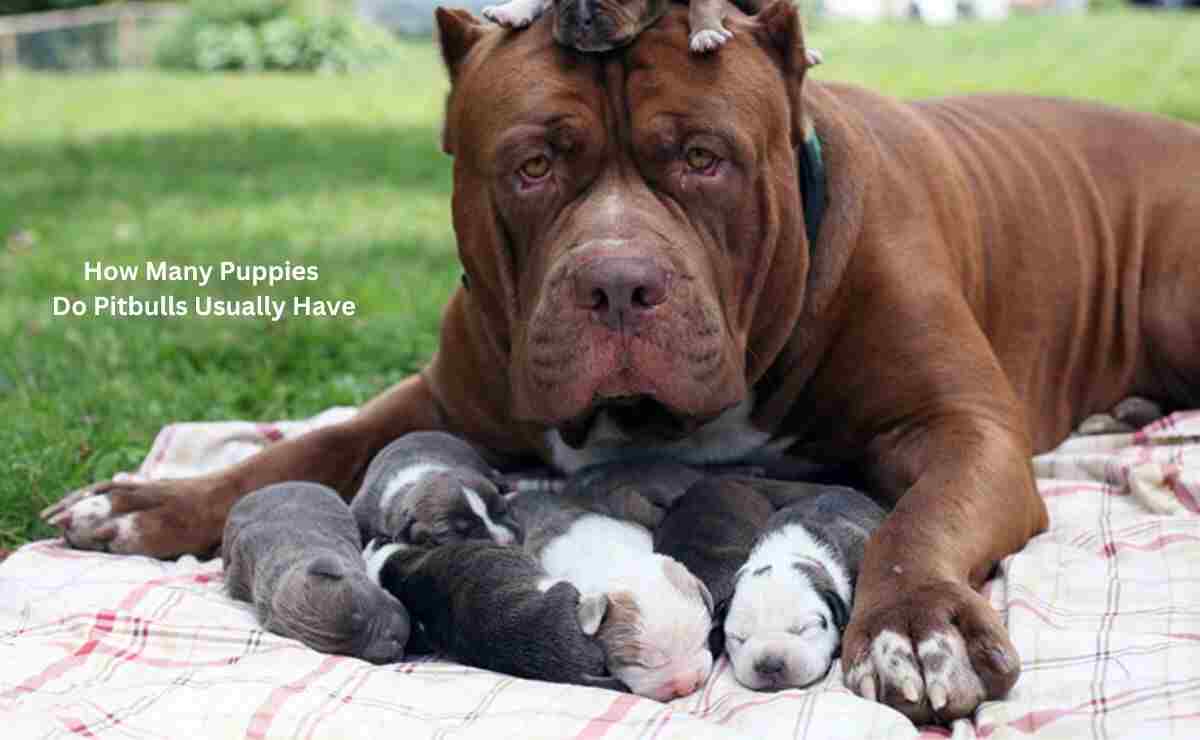Pit bulls are well-known for their rapid sexual development. Usually, male Pit bulls exhibit mounting behavior after a month or two. Let’s start by answering the query: “How many puppies do pitbulls usually have?“
It’s important to rethink your breeding strategy as the dogs reach adolescence. Pit bull terrier females should maintain eating well and good health. Then they’ll be able to have litters averaging five to six puppies.
To answer the query, it is necessary to consider a wide range of variables. Considerations include factors such as the individual’s maturity, size, and genetic profile.
How Many Puppies Do Pitbulls Usually Have?

Bringing a Pitbull into your life is your best thing, and you’ll have twice as much fun with his offspring. A litter of pit bulls will average contain five- ten healthy, happy puppies. Individual pups can have wildly different litter sizes.
The number of puppies born from a given pregnancy is often related to genes, the mother’s health, and the environment.
Pitbull litter sizes are about the same as other large dog breeds. There have been reports of pit bulls having as little as three or four puppies in a litter.
Remember that these are averages, and extremes are constantly on either end. Pit bulls can have healthy puppies with the right attention and control during pregnancy.
It is crucial to follow responsible breeding methods to ensure the mother’s and her puppies’ health.
Frequent veterinary checkups and feeding the mother and puppies properly are necessary. To assure the mother’s and her puppies’ health and safety during the entire breeding process, anyone considering breeding pit bulls or any other breed should speak with a vet.
What Factors Influencing Pitbulls Puppy’s Birth?
Several factors affect the health and growth of Pitbull puppies before, during, and after birth. This is what influences the birth of Pitbull Puppies:
Genetics
The delivery of healthy and strong Pitbull puppies depends greatly on genetics. All the great qualities of both parents go on to the puppies. Fur color, size, and shape are all examples of physical characteristics. Personality and behavior patterns are as important to consider.
Puppies may also be at risk for developing diseases or health problems if their parents have trouble with the same issues. Breeders that care about the quality of their offspring are selective about the matings they allow.
The Health of Parents
Puppies can only be born to healthy moms and dads. The male and female canines should undergo thorough health checks before being bred.
Genetic testing for sensitivity to certain diseases and complete physical tests are part of this process. A happy birth and pup are more likely if both parents are healthy and disease-free.
Breeding Age and Frequency
When and how often a pair of Pit bulls mates also affect the arrival of their offspring. Dogs should wait until the females are at an appropriate age to breed. This promotes health and fertility, reducing the likelihood of difficulties during pregnancy and labor.
Premature breeding puts the mother and her puppies at risk of health issues. A female dog needs time to rest and replenish her strength before undergoing another taxing reproductive period. It’s vital to leave enough time between births.
Line breeding
An essential part of the process of creating a Puppy is line breeding. To increase their offspring population, owners engage in interbreeding. Only highly trained experts should do this. A small mistake could reduce the number of newborns.
Two tiny-sized Pitbulls of the same breed will only have a small litter of puppies. Similarly, breeding unwell dogs will produce smaller and weaker puppies. A more robust and smaller Pitbull partner might expect to have a litter of six to eight puppies.
Nutrition and Care
Pregnant Pitbulls need special attention to ensure their puppies grow healthy and strong. To sustain the mother’s higher nutritional needs and guarantee the proper growth of the puppies.
A nutritious diet rich in important nutrients is necessary. Pregnant animals should visit the vet often. Pregnant dogs benefit greatly from regular exercise and mental exercises to maintain the mother fit and alert.
Environmental Conditions
During pregnancy, ensuring the mother dog is relaxed and comfortable is important. Negative consequences of stress on the mother’s health and the birth process are possible. Keeping the mother as relaxed as possible during her pregnancy is important for preventing delivery difficulties.
Many factors influence whether or not Pitbull puppies are born healthy. Puppies can’t grow to be healthy and happy without carefully considering these variables by breeders.
Frequently Asked Questions (FAQs)
How Many Times Can a Pitbull Get Pregnant?
Like females of other breeds, a female pit bull is fertile whenever she enters heat. When a female pit bull reaches the age of one to eight, she can have two litters yearly. Limit the number of times you breed your pet to three.
Should I breed my Pitbull?
If you’re thinking of breeding your Pitbull, it’s important to remember your goals for the breed. The features you want to see more of and the legacy you want to keep alive.
To ensure the health and safety of the dog and any puppies bred from it, it takes a lot of research, time, and money to breed responsibly.
How long is a pitbull pregnant?
Pregnancy in a dog lasts roughly two months or 62-64 days. Because the date of breeding is not always the same as the date of conception, calculating when a baby will be born can be challenging.
What two dog breeds make a pitbull?
As a fighting dog, the pit bull terrier was developed from bulldog and terrier stock in 19th-century England, Scotland, and Ireland. An additional name for this breed is American Pit Bull Terrier.
Is it safe to have two pit bulls?
Once upon a time, it was widely held that pit bulls and other breeds couldn’t coexist peacefully. This has been disproven. We can safely say. Many pit bulls can coexist peacefully with other canine species.
Conclusion
The owner’s query about how many puppies do pitbulls usually have has already come to an end. The average number of puppies born to a female pit bull is seven. This number can range from five to ten.
Many factors, including genetics, health, and individual variation among dogs, can affect the number of puppies born. Some pit bulls may have smaller litters than others.
Genetics, environmental factors, and maternal health all play a part in deciding a litter’s size.
Therefore, if you want to breed pit bulls, you should go to a vet who can give you information that fits your puppy’s needs.
Related Posts
